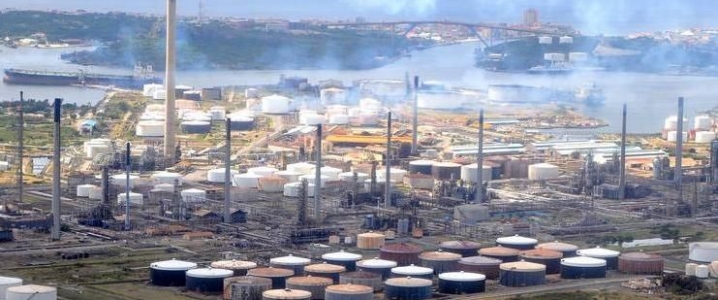In the past, oil has accounted for 96 percent of Venezuela's exports and over 40 percent of government revenues. Now, as the nation’s economy continues to crumble amid sanctions, political strife, and low oil prices, the Venezuela’s all-important oil production is plummeting. In fact, last month’s production was the lowest in 30 years at 1.5 million barrels a day. In desperation, the struggling administration has even begun to shut down production proactively as their terminal storage meets maximum capacity and the government faces major bottlenecks at storage facilities and ports.
As oil production and exports drop, the Venezuelan government has even less money to buy essentials like food, medicines, and other basic goods--a well-established crisis growing worse all the time. The International Monetary Fund (IMF) has said that the brutal economic crisis underway in Venezuela is one of the worst in modern history. The nation’s once powerful economy has plummeted 45 percent in the last five years, and the IMF projects that it will shrink 15 percent in 2018 alone. Out-of-control inflation rates will reach 13,800 percent.
However, in the middle of the chaos -- a collapsing regime, widespread hunger, medical shortages -- there is one holdover from the socialist platform that autocratic President Nicolas Maduro has refused to lapse on. Despite the crisis on his own soil, Maduro continues to grant generous oil subsidies to Cuba.
The small island nation, not without its own economic issues, has been dependent on cheap Venezuelan oil since the 1990s. After the fall of the Soviet Union, comrade Cuba was in economic shambles. It was at this point that they turned to Venezuela reduced-rate crude oil, in exchange for sending skilled laborers across the Caribbean. Related: Yamal LNG Is Conquering China
Now, as Venezuela sinks deeper and deeper into an extreme economic depression, few could have predicted that they would still be making good on that decade-old agreement with Cuba--even the Cubans themselves have been scrambling for new sources of cheap crude. Last year Venezuela even cut off exports to Cuba for eight months, but then once again began sending shipments of light oil to Cuba and Curacao in March 2017 at a great cost to their own refineries, which are running at just a small fraction of their capacity thanks to lack of maintenance and drained funds.
Despite all this, amazingly, there was a reported shipment of 500,000 barrels of Venezuelan crude shipped to northwestern Cuba last week, sparking an uproar back at home. Venezuela continues to supply Cuba with around 55,00 barrels of oil per day, costing the nation around $1.2 billion per year, an unthinkable generosity when 9 million Venezuelans are reporting that they can only afford to eat once a day. This money could be channeled into turning around Venezuela’s own crisis, to curb inflation and import desperately needed medicines that can no longer be found on empty Venezuelan shelves.
There is a new, albeit small, ray of hope, however, for Venezuela’s ailing economy. On July 1st Mexico overwhelmingly elected a leftist president for the first time in decades. Andres Manuel Lopez Obrador, known locally as AMLO, pledged on the campaign trail to bring Mexico’s foreign policy back to a standard of non-intervention. This would mean walking back current neoliberal Mexican President Enrique Peña-Nieto’s efforts to build a regional alliance against Maduro and put pressure on him to ease up on his increasingly despotic tendencies.
Despite public outcry against Maduro’s continued financial support of Cuba as his own people without food and desperately needed medicines, the reality is that Cuba is one of Venezuela’s last remaining allies. Even if Mexico is no longer actively working against Maduro’s regime, they won’t be supporting it the way that Cuba has and continues to do. The sad truth is that Maduro has and likely will continue to put politics over people, and cheap oil will continue to flow out of the pockets of Venezuela and into the ports of Havana, which sit ready and waiting.
By Haley Zaremba for Oilprice.com
More Top Reads From Oilprice.com:
- Oil Slides As Saudis Gear Up To Pump Record Volume
- Exxon’s Papua New Guinea Gas Project Is Dead In The Water
- U.S. Poised To Ease Biofuel Quotas



















1. The subsidies are payment for a number of Cuban health personnel working in Venezuela. However, as medicines and medical equipment are very scarce in Venezuela, the Cuban health personnel can do little for the Venezuelan people, but it has a significant propaganda value.
2. The subsidies are payment for a large number of Cuban security and intelligence personnel working for the government of Venezuela. These people are extremely important to keep Maduro in power, by striking down on popular protest and discovering possible unrest and disloyalty within the military forces.
As staying in power is much more important for Maduro than feeding the people, sending cheap subsidised oil to Cuba is more important than selling the oil on the open market in order to pay for imports that the people desperately need.